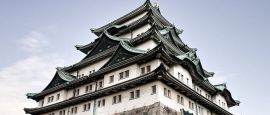The Atsuta Shrine houses the ‘Kusanagi-no-tsurugi’, a sword that is one of the Three Sacred Imperial Treasures in Japan. More than 6.5 million people visit this place annually, the second largest of Japan’s Shinto shrines after the one at Ise. The sword is said to have been given to the imperial family by the goddess Amaterasu Omikami. The museum contains several artefacts of national importance in Japan.
Things to see in Nagoya
Tourist offices
Address: JR Nagoya Station, Nagoya, Japan
Tel: (052) 541 4301.
Opening Hours:Daily 0900-1900. www.ncvb.or.jp
There are also tourist offices at Kanayama Station (tel: (052) 323 0161) and in the Oasis 21 building in Sakae (tel: (052) 963 5252). The information counter at Nagoya International Centre, Nagoya Kokusai Center Building, 1-47-1 Nagano, Nakamura-ku (tel: (052) 581 0100; www.nic-nagoya.or.jp) is also a good source of information about transport, sightseeing and culture in Nagoya.
Tourist passes offering unlimited rides on JR Express trains and buses are available from http://touristpass.jp/en, and the Me-guru One-Day Pass for the Nagoya Sightseeing Route Bus includes discounts to many of Nagoya’s main tourist sites.
The impressive Nagoya Castle was constructed by Ieyasu Tokugawa in 1612 for the Owari Tokugawa family. It was almost completely destroyed by American bombing in 1945, and the current ferroconcrete reconstruction dates from 1959. On top of the building are the two famous golden dolphins, which symbolised the authority of the feudal lord. Today the castle is a museum, and because of its many cherry trees it is very popular during the cherry blossom season.
Nagoya has an excellent aquarium down by the port. It is divided in two buildings. In the north building visitors can see large sea mammals like killer whales, beluga whales and dolphins. In the south building there are tanks representing Antarctic marine life (with plenty of penguins), Australian freshwater life and tropical marine life, as well as a deep sea gallery.
This comprehensive park with a zoo, botanical garden and amusement park is located in the eastern part of Nagoya. Koalas, giraffes and elephants can be seen in the zoo, while the botanic garden boasts a large greenhouse and flower gardens. The Sky Tower has an observation room 100m (328ft) above the ground that offers great views of Nagoya - time your visit for the sunset if you can. A very nice restaurant is located on the top floor.
A treasure trove of Japanese art, furniture and equipment from the feudal period, the collection at the Tokugawa Art Museum consists of the holdings of the Owari branch of the Tokugawa family, who had very close family and political ties to the ruling shoguns throughout the Edo period (1603-1868). Many of the personal effects of Ieyasu Tokugawa, one of the heroes in Japanese history, can be seen, along with a vast variety of artworks, cultural objects and books stretching back to medieval times.
This tranquil Japanese-style garden adjacent to the Tokugawa Art Museum was donated to the city by the Tokugawa family in 1931 but bombed during WWII, with only the main gate left standing. After many years as a park, a restoration project ended in 2004. The centrepiece of the garden is an ornamental lake with waterfalls and bridges, and winding paths showcase blooming peonies and irises (among others) in summer and vivid maple trees in the autumn.
Housed in a modern building designed by Kisho Kurokawa, Nagoya’s art museum boasts a collection of 2,500 local and international artworks. It focuses on modern artists of the local Ise Bay area, but also features works by Ecole de Paris and Mexican Renaissance artists to show how these have influenced local artists.
This is the sister museum of the famous Museum of Fine Arts in Boston, which has one of the best art collections in the world. The Nagoya annexe permanently exhibits an excellent range of art works from the Boston collection, so it’s possible to see modern European and American masters as well as ukiyo-e (woodblock prints) and other forms of Japanese art.
The famous Noritake factory (the birthplace of the modern ceramic industry in Japan) is surrounded by beautiful, lush gardens, and there is a crafts centre where visitors can see how ceramics are made and even try their hand at it themselves. There is also a museum displaying early Noritake ceramics items, including wonderful pieces from the art deco and art nouveau periods.
Trainspotters - and anyone interested in Japan's bullet train technology - will find much to delight in this museum run by Central Japan Railways. As well as historic steam locomotives, exhibits include experimental versions of shinkansen (bullet trains) and maglev, the world's fastest train at 581km/h (361mph). There are also train and crew simulations, miniature train dioramas and, on the second floor, special exhibits geared at younger children. An audio guide is available in English.
Do you have any Feedback about this page?
© 2026 Columbus Travel Media Ltd. All rights reserved. No part of this site may be reproduced without our written permission, click here for information on Columbus Content Solutions.








 You know where
You know where